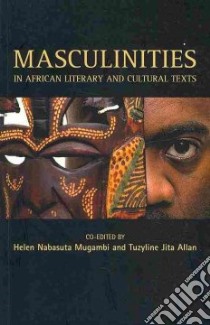- Libreria
- >
- Libri in lingua
- >
Masculinities in African Literary and Cultural Texts - 9780955507953
Un libro in lingua di Mugambi Helen Nabasuta (EDT) Allan Tuzyline Jita (EDT) Kalu Anthonia (FRW) Gikandi Simon (AFT) edito da Lynne Rienner Pub, 2010
- € 24.10
- Il prezzo è variabile in funzione del cambio della valuta d’origine
Wonderfully-crafted and provocatively-titled essays engage genres of oral and written literature and film. Helen Nabasuta Mugambi and Tuzyline Jita Allan combine their formidable experience in researching and writing about issues of gender as it pertains to women in/and African literatures to address this absolutely critical topic. Indeed, many African feminists assert that it is hyper-masculinity which has ruled (and in some cases violently destroyed) post-independence African dreams and desires. This impressive collection provides many answers and is destined to become a staple in the library of African Studies, African Literary Studies, but also Women's Studies, Gender and Development, Sexuality and Human Rights.-Carole Boyce Davies, Cornell University, USA.
This book brings fresh thinking on an old but not so closely examined subject. Thanks to the analytical strengths of each contribution and to the strategic critical and synthesizing judgement of Helen Nabasuta Mugambi and Tuzyline Jita Allan as editors, we are blessed with a wide range of critical perspectives organized into carefully balanced and complementary relationships. We have the views of African and Africanist scholars based on the continent and compatriots located elsewhere in the world, from the research scholar and the creative writer or filmmaker, and above all, the views of the female and of male contributors, each offering important insights that both clarify and complicate our hitherto stereotypical notions of masculinities in Africa.-Kofi Anyidoho, University of Ghana, Legon.
This is the first time, as far as I know, that authors of enormous clout in African Studies have come together to discuss masculinity, not as an antagonistic trend but as a diverse cultural, historical and political concept in African traditions. Every chapter here makes a significant contribution to the growing theoretical and analytical scholarship in the field. The editors deserve commendation for putting together important materials that have opened up a new dimension in Cultural and Gender Studies.-Abdul-Rasheed Na'Allah, Vice-Chancellor, Kwara State University, Nigeria, Author of African Discourse in Islam, Oral Traditions and Performance.
Informazioni bibliografiche
- Titolo del Libro in lingua: Masculinities in African Literary and Cultural Texts
- Lingua: English
- Autori : Mugambi Helen Nabasuta (EDT) Allan Tuzyline Jita (EDT) Kalu Anthonia (FRW) Gikandi Simon (AFT)
- Editore: Lynne Rienner Pub
- Collana: (Paperback)
- Data di Pubblicazione: 30 Gennaio '10
- Genere: LITERARY CRITICISM
- ISBN-10: 0955507952
- EAN-13: 9780955507953


